Middle East
Analysis: Call to disband PKK reshapes Turkiye, Syria power dynamics | Syria’s War News
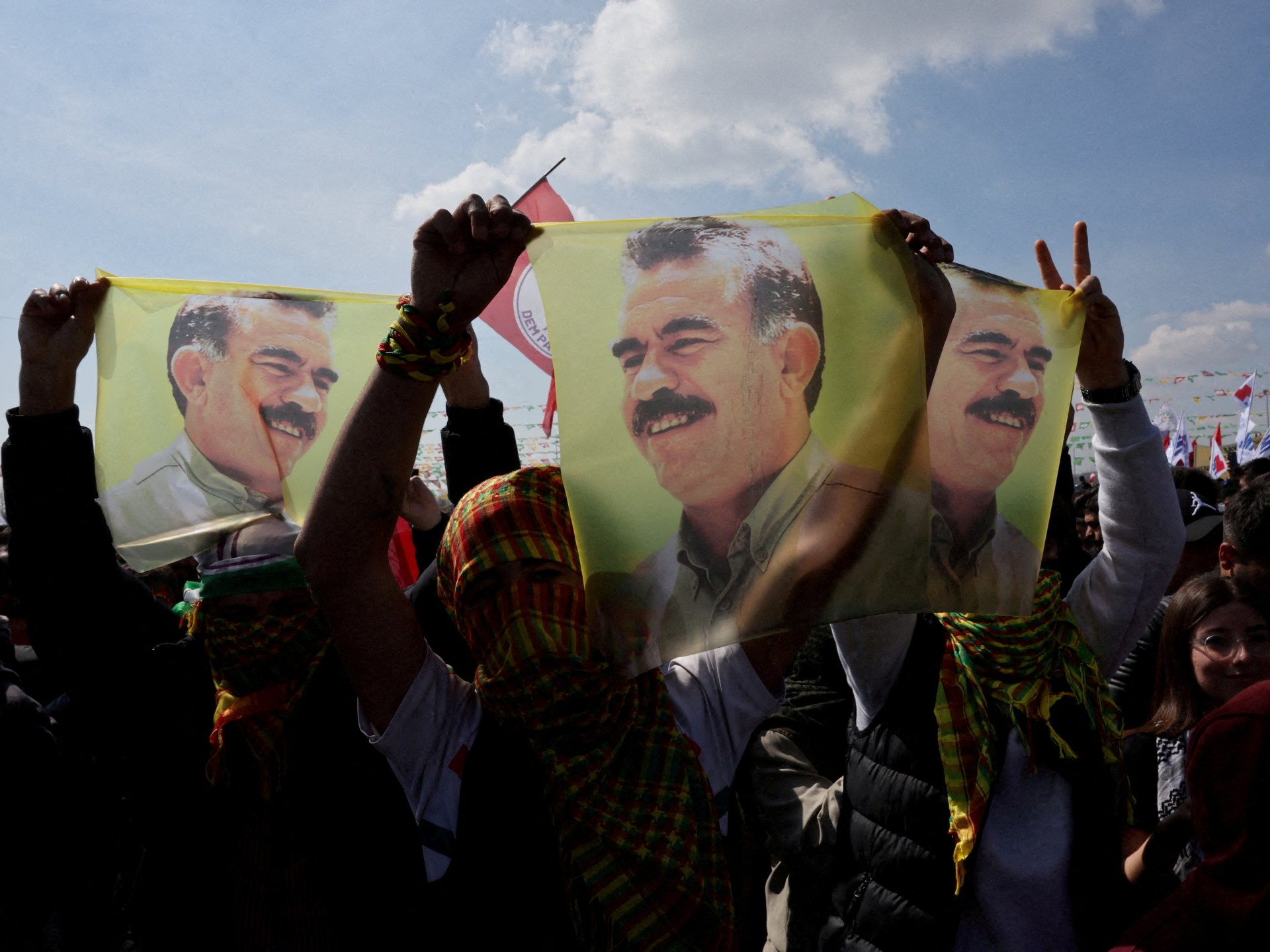
The consequences of the call by the founder of the Kurdistan Workers’ Party (PKK), Abdullah Ocalan, for the group to disband are still reverberating – not just in Turkiye but also in the wider region.
Shifting alliances in Syria – exemplified by the recent agreement between the Kurdish-led Syrian Democratic Forces (SDF) and the Syrian government – confirm that Ocalan’s message is not isolated or purely domestic but offers a crucial opportunity that could redefine everything from Turkiye’s security policies to the future positioning of Kurdish actors, shaping the next phase of regional power dynamics.
Ocalan, in a statement delivered from a Turkish prison in late February, called on the PKK to “convene your congress and make a decision. All groups must lay down their weapons, and the PKK should dissolve itself.”
The PKK leadership – from its longstanding command centre in Iraq’s Qandil Mountains – responded to Ocalan’s call by declaring a unilateral ceasefire with final disbandment as well as decisions on disarmament and other matters delayed until the congress can be held in a month or two. Turkiye remains firm in its demand that all PKK-affiliated groups, including its Syrian offshoots, must disband unconditionally.
The PKK’s decades-long conflict with Turkiye has killed more than 40,000 people. Ocalan, in addition to being the leader of the movement ideologically, also led the group’s armed rebellion until his capture in 1999. The PKK is considered a terrorist organisation by Turkiye, the United States and the European Union.
While Ocalan has advocated for ceasefires in the past, this is the first time he has called for the PKK to cease to exist, the reason for this likely being linked to shifts in Kurdish political movements, Turkish state strategy and broader regional realignments, especially the evolving dynamics in Syria.
Removing the Kurdish ‘fear factor’
The diminishing strategic value of armed struggle has coincided with the rise of Kurdish political actors, weakening the PKK’s role as a “fear factor” in Turkish politics.
Once instrumental in mobilising nationalist votes for the ruling Justice and Development Party (AK Party), the PKK’s influence is fading as pro-Kurdish politics gain traction.
The Peoples’ Democratic Party (HDP) broke new ground in June 2015 by surpassing the 10 percent electoral threshold required to secure parliamentary representation – an achievement that pro-Kurdish parties had previously managed only by running independent candidates.
Today, the party now known as the Peoples’ Equality and Democratic Party (DEM) plays a pivotal role in elections as Kurdish votes shape Turkiye’s political landscape.
Against this backdrop, Ocalan’s call for the PKK’s disbandment is an effort to expand the space for Kurdish political representation within the democratic system.
Kurdish political mobilisation through political parties has become more powerful and influential than armed struggle.
The growth has not been unimpeded as state-imposed restrictions have continued.
For example, Selahattin Demirtas, the former leader of the HDP and a former presidential candidate, remains imprisoned, and Kurdish politicians and activists accused by the government of being close to the PKK face harsh sentences under “anti-terror” laws.
After the 2024 municipal elections, the government once again appointed trustees in some Kurdish-majority municipalities, preventing elected mayors from the DEM party from taking office.
These restrictions, however, may begin to ease with the gradual normalisation of pro-Kurdish politics, which could emerge as a result of the removal of the “terrorist” label from the broader movement and the construction of a new narrative that positions pro-Kurdish representatives as recognised political actors.
Turkiye’s stake
For the AK Party, consolidating electoral support requires a delicate balance between addressing Kurdish demands – and gaining those votes – and maintaining Turkish nationalist backing.
Had this initiative to talk to the PKK been driven solely by President Recep Tayyip Erdogan without the involvement of Nationalist Movement Party (MHP) leader Devlet Bahceli, who had long opposed any solution other than a military one, nationalist opposition to it would have been far more pronounced.
By having Bahceli invite Ocalan to address parliament and advocate for the “right to hope” – a measure supporting the release of individuals, including Ocalan, who have served 25 years – and engage in dialogue with DEM figures he had previously labelled as “terrorists”, the government has managed to pre-emptively contain hardline resistance, making the transition more politically viable.
A successful peace process could help rekindle support for the AK Party among Kurdish voters who had turned away from the party since the collapse of the Turkiye-PKK peace process in 2015 and the government’s turn towards Turkish nationalism – as well as attract a new generation of Kurdish voters.
On the other hand, opposition within Turkiye to such a development remains a wild card. Hardline factions within the government and in nationalist circles are likely to resist any perceived concessions to pro-Kurdish political actors.
Externally, the “Kurdish issue” has long been an obstacle in Turkiye’s foreign relations, particularly with Western allies and the EU, for which Turkiye remains a candidate country.
Concerns over rights and liberties, the undermining of Kurdish rights and political representation, the imprisonment of Kurdish politicians and Western support for Kurdish groups fighting ISIL (ISIS) in Syria have all contributed to tensions in Turkiye’s foreign relations.
By proactively managing this transition, Ankara could frame itself as the architect of Kurdish political normalisation, strengthening its stance both regionally and internationally.
Meanwhile, the reality that neither Turkiye nor the PKK can achieve absolute victory militarily has become increasingly clear. The decline in active conflict within Turkiye has also reshaped public perception.
Turkiye’s military operations in Syria – Euphrates Shield (2016-2017), Olive Branch (2018) and Peace Spring (2019) – shifted the primary battleground from Turkiye’s border areas into northern Syria, where clashes between the Turkish-backed Syrian National Army (SNA) and Syrian Kurdish forces continue.
This strategy has not only established Turkish-controlled zones but also altered the conflict’s geography, reducing direct threats to Turkiye while intensifying power struggles in Syrian areas like Afrin, Ras al-Ain, and Tal Abyad.
The PKK’s disbandment is not a done deal, however, and opposition parties, particularly the Republican People’s Party (CHP), which is desperately eager to end the AK Party’s 23-year rule, remain hesitant to support the initiative.
While the CHP officially endorses a peaceful resolution to the “Kurdish issue”, it is sceptical of a process led by Erdogan’s government, not knowing what may be unfolding in closed-door negotiations.
Moreover, the CHP is cautious about lending legitimacy to a process that could strengthen the AK Party’s appeal among Kurdish voters, particularly with elections in the future.
For now, it has adopted a wait-and-see stance because the only thing known is the intent of the PKK to dissolve rather than its actual mechanisms.
![Abdullah Ocalan, the jailed leader of the outlawed Kurdish militant group PKK, is seen with politicians and lawmakers of the pro-Kurdish Peoples' Equality and Democracy Party (DEM Party) Ahmet Turk, Pervin Buldan, Sirri Sureyya Onder, Tulay Hatimogullari, Tuncer Bakirhan, Cengiz Cicek and Faik Ozgur Erol, in Imrali Island prison, in Marmara Sea, in Turkey, February 27, 2025. [Peoples' Equality and Democracy Party Handout via Reuters]](https://www.aljazeera.com/wp-content/uploads/2025/02/2025-02-27T151559Z_1225325094_RC203DAC3IJM_RTRMADP_3_TURKEY-KURDS-OCALAN_cropped-1740682662.jpg?w=770&resize=770%2C433)
The Syrian equation
Ocalan’s appeal reflects a broader shift as nonstate armed groups across the region face growing pressure to adapt for survival and legitimacy.
In northern Syria, a strategic priority for the Democratic Union Party (PYD) and its armed wing – the People’s Defence Units (YPG), which is the core force in the US-backed SDF – is preserving their territorial and political position.
Set up in 2003 as a PKK offshoot, the PYD came into its own in northern Syria and has been targeted in military offensives by Ankara and Ankara-supported groups in Syria, such as the SNA.
Ocalan may have been motivated by a hope that a disbanded PKK would result in fewer direct confrontations between Turkiye and the PYD, possibly helping the PYD keep a level of self-administration and rights within the new Syrian state and constitution.
An important step in this direction came on Monday when the SDF signed an agreement in Damascus with interim President Ahmed al-Sharaa for their forces to merge with the Syrian army and cooperate on several economic, social and political fronts.
Whether this will be enough for Turkiye to relent in its pursuit of the SDF depends on the details of the agreement and its implementation. So far, the agreement has been supported by Erdogan, who emphasised that the full implementation of the agreement would serve Syria’s security and stability and benefit all Syrians.
Public statements by Foreign Minister Hakan Fidan previously showed that Turkiye aims to shape the terms of the PYD’s acceptance within a reconfigured Syrian framework by calling for the removal of foreign PKK elements, dismantling the YPG’s military leadership and integrating the PYD into the Syrian state without its armed wings or territorial ambitions.
What’s likely to follow?
A resolution of the “Kurdish issue” could enhance Turkiye’s diplomatic leverage, especially with European and American actors critical of its policies against Kurds domestically and in neighbouring states.
A sustainable process may also ease tensions with Iraq and Syria, where Turkiye’s operations against Kurdish groups have caused friction. This would further strengthen security and economic cooperation with Baghdad and the new government in Damascus.
While legislative steps will play a crucial role in facilitating this transition, a well-defined roadmap with legal, political and social adjustments is necessary.
The focus will soon shift to the future of PKK fighters. According to intensifying public debate in Turkiye, several potential pathways exist.
Some may receive legal amnesty and reintegration support. Others may be absorbed into legitimate Kurdish political structures, and some senior leaders may be relocated to third countries with their current base in Iraq being a likely destination.
Ultimately, the sustainability of this process will be determined by meaningful democratic reforms, expanding cultural and political rights, safeguarding civil liberties and paving the way for a new democratic constitutional framework as a foundation of a more inclusive political order.

However, based on declarations by Turkiye’s state actors, the current vision does not include any of these major reforms. How the PKK’s dissolution could occur without these fundamental changes remains an open question. For its fighters, a legal framework will be a necessity for disarmament, demobilisation and reintegration.
While some figures within the DEM advocate for a fast-tracked process to consolidate their political standing and deliver gains for their constituents, AK Party politicians could be motivated by electoral concerns, seeking a resolution that neutralises tensions without making deep structural concessions.
The PKK’s ceasefire is a notable first step, but its long-term viability depends on how to institutionalise it, which a purely tactical or rushed settlement could not provide.
At the same time, it is crucial to recognise that no peace process can be built on uncompromising demands or an idealised, frictionless roadmap.
Sustainable peace requires pragmatic solutions, gradual steps, and an acceptance that negotiations will involve setbacks, competing interests and the necessity of mutual concessions.
Middle East
Iran says progress in nuclear talks with US, confirms third round next week | News
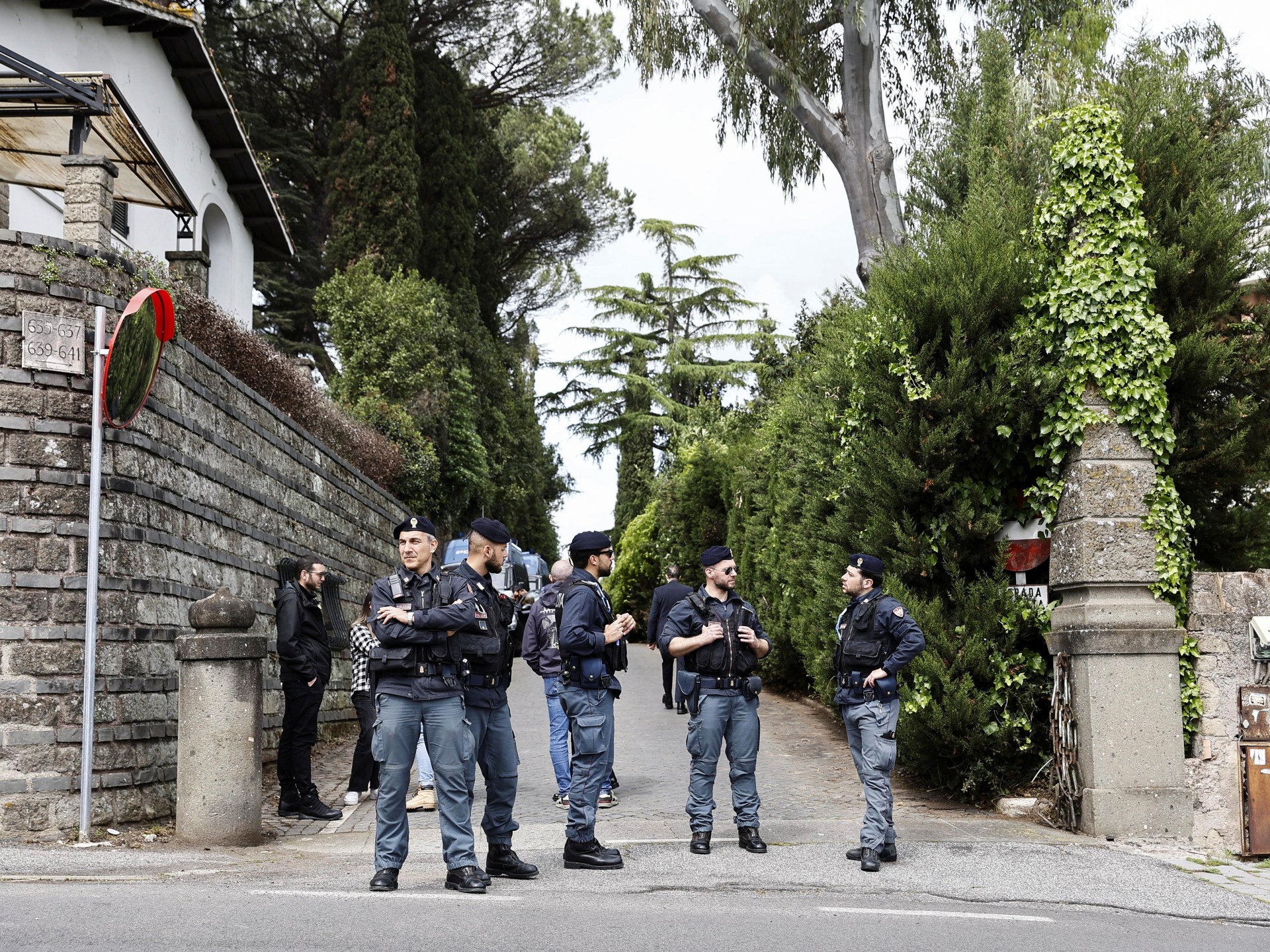
After technical talks, senior negotiators expected to reunite on April 26, according to Iran’s foreign ministry.
Iran and the United States have completed a second round of indirect nuclear negotiations, which Iran’s foreign minister has described as “constructive” and moving forward with further meetings planned in the coming week.
Abbas Araghchi and US Middle East envoy Steve Witkoff held four hours of indirect talks at Oman’s embassy in the Italian capital, Rome, on Saturday, according to Araghchi.
“We succeeded in reaching a better understanding on certain principles and goals,” the diplomat was quoted by the semiofficial Tasnim news agency as saying. “The negotiations were conducted in a constructive atmosphere and are progressing.”
There has been no readout yet of the meeting from the US side.
The delegations – led by Araghchi and Witkoff, a billionaire real estate executive whom US President Donald Trump has dispatched on numerous foreign policy missions – stayed in separate rooms in the embassy as Omani Foreign Minister Badr al-Busaidi shuttled messages between them, according to Iranian officials.
Iran’s Ministry of Foreign Affairs said the parties will hold more indirect, technical-level talks in the coming days, followed by another meeting with senior officials on April 26.
There were useful indirect talks today between Iran and the United States conducted by Oman Foreign Minister in a constructive atmosphere.
The two sides agreed to continue the indirect talks in few days at technical level to be followed by another round at their own level on…
— Esmaeil Baqaei (@IRIMFA_SPOX) April 19, 2025
“I hope that after next week’s technical sessions, we’ll be in a better position,” Araghchi said, according to Tasnim. “There’s no reason for excessive optimism or pessimism.”
‘Negotiations to pick up’
Al Jazeera’s James Bays, reporting near the Omani diplomatic compound in Rome, said the Iranian response was “very positive” for a delegation that “had seemed pretty negative going into the talks”.
Next week’s planned talks mean “the pace of negotiations is going to be picked up”, Bays said.
The latest meeting comes a week after Iran and the US came together in Muscat for their first high-level discussions since Trump in 2018 unilaterally abandoned a landmark nuclear accord signed and brokered by world powers in 2015.
The Iranians “are looking for a kind of consistency when it comes to the current talks”, Al Jazeera’s Tohid Asadi reported from Tehran.
Will US accept civilian nuclear programme?
Western governments, including the US, have long accused Iran of seeking to develop nuclear weapons – an allegation Tehran has denied, insisting its nuclear programme is solely for peaceful civilian use. On Wednesday, the head of the International Atomic Energy Agency, Rafael Grossi, said Iran was “not far” from possessing a nuclear weapon.
Grossi was also in Rome on Saturday meeting Italian Foreign Minister Antonio Tajani. Grossi’s nuclear watchdog would likely be central in verifying compliance by Iran should a deal be reached, as it did with the 2015 accord.
The US and Iran have had no diplomatic relations since shortly after Iran’s 1979 Islamic Revolution. After returning to office in January, Trump revived his “maximum pressure” sanctions campaign against Tehran, but in March, he sent a letter to Iranian Supreme Leader Ali Khamenei calling for renewed negotiations – while warning of military consequences if diplomacy fails.
“I’m not in a rush” to use force, Trump said on Thursday. “I think Iran wants to talk.”
On Friday, Araghchi said the US showed “a degree of seriousness” during the first round of talks but questioned Washington’s “intentions and motivations”.
Bays said the heart of the dispute remains whether Iran may maintain a civilian nuclear programme – or whether, as hardliners in Washington insist, it must dismantle its nuclear programme entirely.
“All they’ve been talking about last week in Muscat and here in Rome is a framework for the discussions and what they want to achieve,” Bays said. “They have not been discussing the nuclear detail, … and the devil is in the detail on these things.”
Middle East
Over 170 arrested for attacks on Pakistan KFC outlets in Gaza war protests | Israel-Palestine conflict News
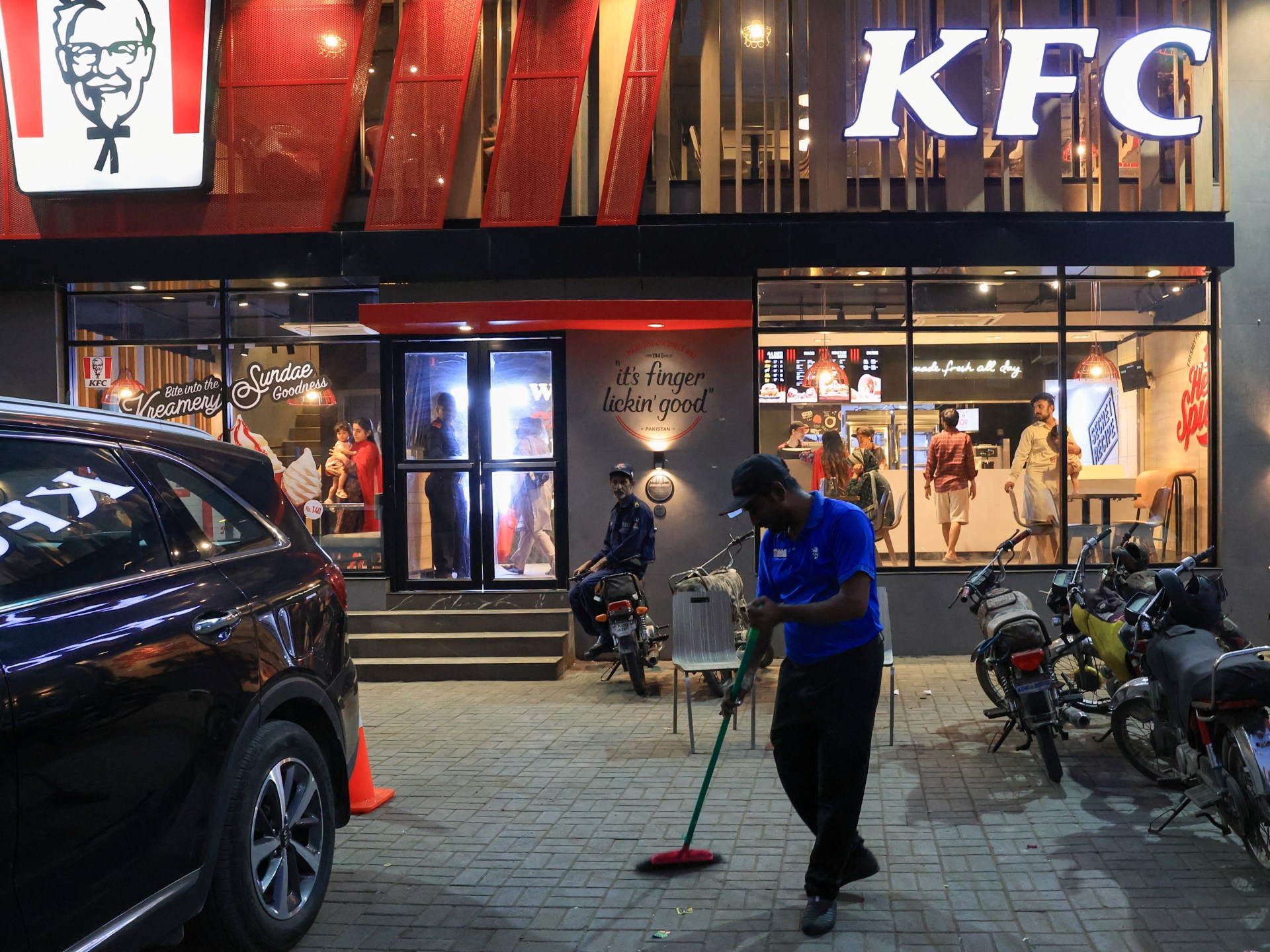
Western brands have been hit by boycotts and other forms of protests in Muslim-majority countries due to the Gaza war.
Police have arrested close to 200 people in Pakistan in recent weeks after more than 10 group attacks on outlets of the United States-based fast-food chain KFC, sparked by anti-US sentiment, unconditional US backing for Washington’s close ally Israel and opposition to Israel’s war in Gaza, officials say.
The fast-food chain has become a target of protest and boycott calls by Islamist parties since the start of the war in Gaza as they link the brand to US support for Israel.
At least 178 people have been arrested, the officials said this week.
Police in major cities in Pakistan – including the southern port city of Karachi, the eastern city of Lahore and the capital, Islamabad – confirmed at least 11 incidents in which KFC chicken restaurants were attacked by protesters armed with sticks and vandalised.
A police official, who spoke on condition of anonymity, said one KFC employee was shot and killed this week in a store on the outskirts of Lahore by unknown gunmen. The official added there was no protest at the time and police were investigating whether the killing was politically motivated or for some other reason.
In Lahore, police said they were ramping up security at 27 KFC outlets after two attacks took place and five were prevented.
“We are investigating the role of different individuals and groups in these attacks,” Faisal Kamran, a senior Lahore police officer told the Reuters news agency, adding that 11 people, including a member of the Islamist party Tehreek-e-Labbaik Pakistan (TLP), have been arrested in the city. He added the protests were not officially organised by the TLP.
TLP spokesman Rehan Mohsin Khan said the group “has urged Muslims to boycott Israeli products, but it has not given any call for protest outside KFC”.
“If any other person claiming to be a TLP leader or activist has indulged in such activity, it should be taken as his personal act which has nothing to do with the party’s policy,” Khan said.
Western brands have been hit by boycotts and other forms of protests in Pakistan, other Muslim-majority countries and several Western nations over Israel’s military offensive in the Gaza Strip.
In February last year, McDonald’s cited boycott campaigns in the Middle East, Indonesia and Malaysia for sales growing just 0.7 percent during the fourth quarter of 2023, compared with 16.5 percent growth in the same quarter the previous year.
Unilever – which produces Dove soap, Ben & Jerry’s ice cream and Knorr stock cubes – also said sales in Indonesia in the same quarter had experienced a double-digit decline as a result of “geopolitically focused, consumer-facing campaigns”.
A KFC restaurant in the Pakistan-administered region of Kashmir was also set on fire in March last year as protesters chanted “Free Palestine.”
More than 51,900 people have been killed in Gaza during Israel’s war, which began 18 months ago.
At least 1,139 people were killed in Israel during the Hamas-led attacks of October 7, 2023, and more than 200 were taken captive.
KFC and its parent company Yum Brands have not yet responded to news of the arrests in Pakistan.
Middle East
Israeli bombardment of Gaza kills 92 in two days: Health Ministry | Israel-Palestine conflict News
At least 219 people have also been injured in attacks since Good Friday, with many children among the casualties, according to health officials.
Israeli attacks have killed 92 Palestinians in the Gaza Strip over the past two days, according to the territory’s Ministry of Health.
The attacks, which took place on April 17-19, have also left at least 219 people wounded and hospitalised, the ministry said in a statement on Saturday, with dozens more still trapped under the rubble or in areas that rescuers are unable to reach.
The surge in bloodshed comes as Israel presses a six-week aid blockade and demands that Hamas disarm before any truce can be agreed. The armed group has flatly refused the demand and insists a permanent ceasefire must be part of any deal.
At least 15 children, hit during an overnight air raid on tents in Khan Younis, were among the casualties, according to the statement. A raid on Rafah killed a mother and her daughter alongside two others, according to the European Hospital where their bodies were taken.
“For the vast majority of civilians, nighttime is the time of horror and unrelenting pain,” said Al Jazeera’s Tareq Abu Azzoum, reporting from central Gaza. “Nobody is safe in their homes, in the makeshift tents, in displacement camps.”

‘Less than a meal a day’
After restarting its military campaign on March 18 following a brief ceasefire, Israel has pledged to intensify its 18-month war on Gaza and occupy large “security zones” inside the Strip.
Since March 2, it has also blocked the entry of food, fuel and aid into the enclave, defying an order by the International Court of Justice (ICJ) that it must allow humanitarian access.
Aid groups warn food is running out.
“Kids are eating less than a meal a day and struggling to find their next meal,” said Bushra Khalidi, policy head of Oxfam. “Malnutrition and pockets of famine are definitely occurring in Gaza.”
Earlier this week, Hamas rejected an Israeli proposal to pause fighting for 45 days if the Palestinian group releases 10 live captives and agrees to disarm.
“The request to disarm Hamas is not acceptable to even hear,” senior Hamas official Sami Abu Zuhri said. “This is not just a red line. It is a million red lines.”
Hamas has offered to free all remaining captives – believed to be about 58 although several are dead – in return for a permanent end to the war and the Israeli army’s full withdrawal.
The death toll in Gaza has now reached 51,065, with 116,505 wounded, according to the Health Ministry.
“We can see the very psychological toll in the city on the faces of everyone here, people are walking very exhausted, traumatised,” said Abu Azzoum. “They are thinking about the dark future that awaits them.”
-

 Education1 day ago
Education1 day agoHarvard’s battle with the Trump administration is creating a thorny financial situation
-

 Sports2 days ago
Sports2 days agoAaron Rodgers ‘not holding anybody hostage’ as he decides his future, retirement a possibility
-
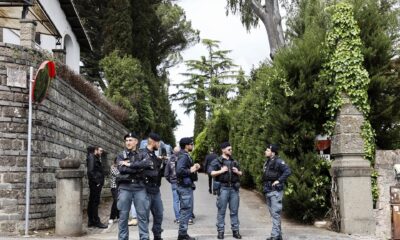
 Middle East8 hours ago
Middle East8 hours agoIran says progress in nuclear talks with US, confirms third round next week | News
-
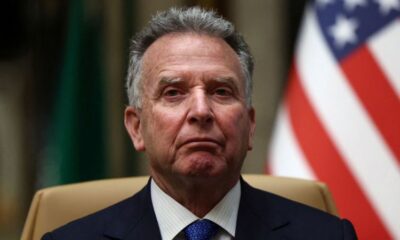
 Europe1 day ago
Europe1 day agoTrump’s ‘lone ranger’: How Steve Witkoff became the defacto point man on America’s foreign policy challenges
-

 Lifestyle1 day ago
Lifestyle1 day agoSweets from the sky! A helicopter marshmallow drop thrills kids in suburban Detroit
-
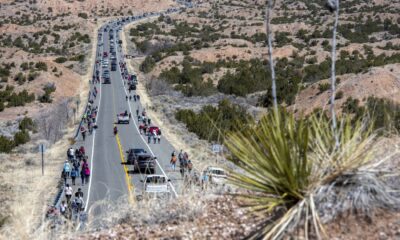
 Lifestyle2 days ago
Lifestyle2 days agoThousands of pilgrims trek through New Mexico desert to historic adobe church for Good Friday
-
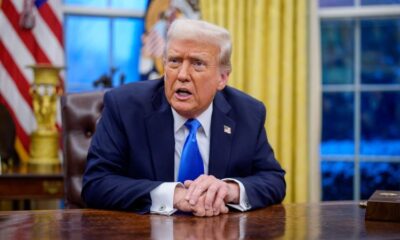
 Europe1 day ago
Europe1 day agoThe Trump administration says Europe is taking advantage of the US. That’s not exactly true
-

 Conflict Zones1 day ago
Conflict Zones1 day agoTrump says US may ‘pass’ on helping end war if Russia, Ukraine resist deal | Russia-Ukraine war News



